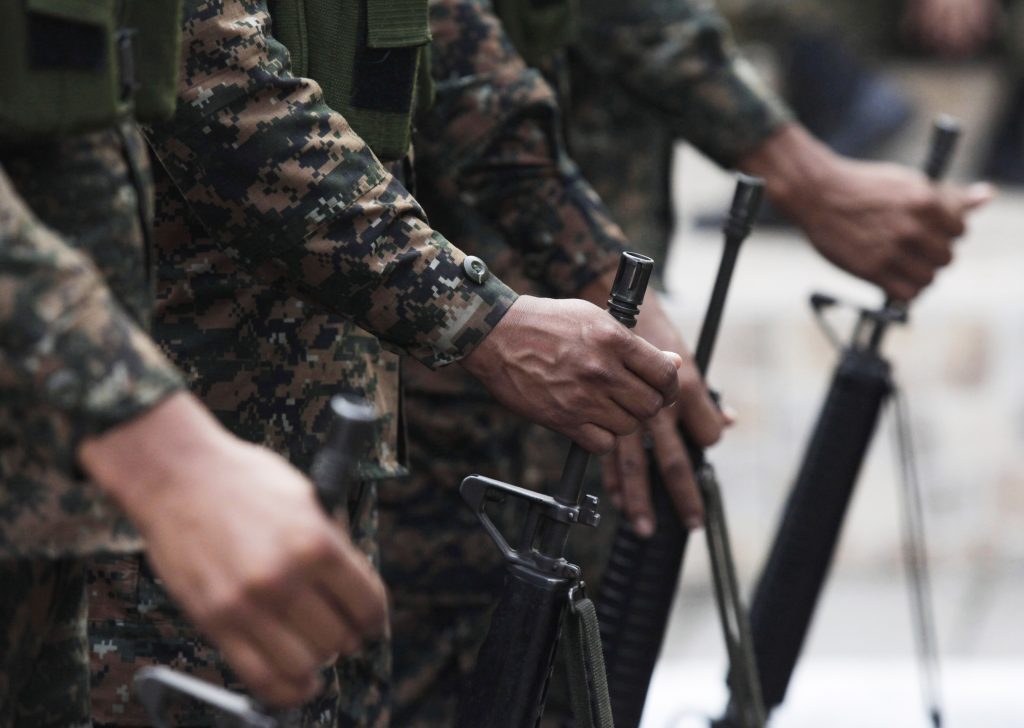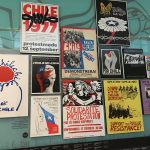A year ago, the media were directing our attention to caravans of Hondurans, Guatemalans and Salvadorans leaving their homes to trek to the United States. The images of thousands of people fleeing from violence and poverty made headlines around the world, provoking reflection by policymakers, civil society, and academics on the “root causes” of emigration and forced displacement. It was clear that decades of heavy-handed approaches to violence reduction in the region had failed, and that poverty and unemployment continued at stubbornly high rates.
Pushed by US cuts to assistance this time last year, the region’s leaders were forced to take increasing responsibility for stemming the flow of migrants. Responding to a reporter’s question about a horrifying photo of Salvadoran migrants who died trying to cross the Rio Grande, El Salvador’s newly inaugurated president Nayib Bukele, said:
“They feel it is safer to cross a desert, three frontiers, and all of the things that may happen [on] the road to the United States because they feel that’s more secure than living here . . . We will make a country that is more prosperous and that can provide decent-paying jobs for all of our people. So if people have an opportunity for a decent job, a decent education, a decent health care system, and security, I know that forceful migration will be reduced to zero.”
That photo of the doomed migrants Óscar and his daughter Valeria depicted the vulnerability that comes when human beings are robbed of their dignity, while President Bukele’s response did not convey an understanding of just how much poor governance exacerbates that vulnerability.
As Óscar and Valeria left their home near San Salvador last year, the Pulte Institute for Global Development was holding a series of dialogues on emigration from Central America. The dialogues brought together a diverse group of experts from the region and the United States, who together concluded that “without systemic and structural change, the root causes of emigration will persist long after the current spike in migration has subsided.”
In other words, any intervention in employment, education, health, or security of the kind President Bukele promised, will not take root in the absence of robust democratic norms, practices, and institutions. It is no secret that politicians, especially those governing fragile democracies, often ignore democratic norms and the rights of the most vulnerable. The rhetoric they prefer, extolling their “noble” defense of the common good, both masks and authorizes a heavy-handed approach to security, which lends itself readily to state violence. Sadly, we see this pattern amplified in the severe response to the pandemic.
Today, with the world’s attention understandably focused on the pandemic as it surges around the globe, affecting the daily life of almost every person on the planet like no other event in modern times, migration has received relatively less media coverage. While each country looks inward and attention is diverted elsewhere, Central American leaders have chosen autocracy over democracy, and repression over rights.
Stay-at-home meets authoritarian lockdown
Along with much of the world, the governments of El Salvador, Honduras and Guatemala implemented lockdown measures beginning in mid-March. Unlike most of the world, however, those lockdown measures have not been eased over time. The measures included mandatory domestic quarantine, restrictions on freedom of movement, the closure of airports and borders, the deployment of military and police officers on the streets, and, in some cases, the declaration of a state of exception (where the rule of law temporarily takes a back seat while securitized public health measures drive).
While a lockdown proportionate to the imminent risk was necessary for public health and safety, the exploitation of the lockdown is troubling. The adult population in both Guatemala and El Salvador are especially mindful of the rights and separation of powers established at the end of decades of war in the late twentieth century. Meanwhile, in these countries as well as in Honduras, around thirty percent of the region’s population lives below the poverty line. Even modest quarantine measures are almost impossible to respect and maintain for long among the poor as the need for minimal income and food has led people to defy lockdown orders.
In short, the concentration of power among the presidents in each country, enhanced by the “imitation” of virus containment policies from the global north, has made it impossible for the population openly to question measures such as full lockdowns that are impractical in poor countries where overcrowded homes, poor access to health services, and low-quality, physical labor are the rule rather than the exception.
Human rights at risk
As a result, human rights watchdogs (including the UN Office of the High Commissioner for Human Rights and Human Rights Watch) have documented numerous increases in abuses by police in El Salvador, repressive actions in Honduras, and corruption in Guatemala. Most egregiously, President Bukele in El Salvador, who championed a better life for would-be migrants less than a year ago, has repeatedly ignored Supreme Court orders to end arbitrary and indefinite detentions in unsanitary and dangerous facilities for apparent violations of quarantine.
Measures to contain the virus have required some tradeoffs between the right to liberty and movement, on the one hand, and the right to health (“personal security”) on the other. However, no measures should infringe upon other basic human rights such as equality, non-discrimination, and freedom from arbitrary detention.
The work of local human rights advocates, who monitor the impact of these repressive measures, is especially crucial now. With limited travel and local circulation, local networks are more important than ever. Cristosal and the University of Central America, partners of the Pulte Institute and the Central America Human Rights Research Network, are documenting human rights violations in the region. A few of the most egregious violations documented by Cristosal during one week in May include:
- The detention of a woman for taking her child to an outhouse, and the subsequent refusal to recognize court rulings for her release.
- Detention of multiple individuals for over 30 days, despite negative COVID-19 test results.
- Riot police searches of quarantine centers to remove cell phones, vitamins, hand sanitizer and masks.
- Targeting of LGBTQ+ individuals for detention and exposure to harassment at quarantine centers.
How will this end for the most vulnerable?
For all of the speculation about when and how the world will emerge from the pandemic, one thing is clear—the dignity of the most vulnerable in Central America will be threatened even more than when Óscar and Valeria attempted to cross the Rio Grande last year.
The social and economic consequences of the pandemic are almost incalculable and will certainly disproportionately impact the poor and vulnerable. Decreased work for migrants already in the United States, and limited future economic emigration will dry up the remittance lifeline for the poorest in Central America. Meanwhile, the violence that surrounds the poor and drives emigration will certainly worsen. For example, after an immediate decrease in extortions and a decrease in homicides during the first weeks of quarantine, violence has resurged. In fact, gangs, though once supportive of the quarantine measures implemented by the government, have redoubled their threats to the poor communities they control as extortion enterprises reopen with renewed fervor.
What will this all mean over the coming months, even if the pandemic can be controlled soon?
Before all else, local civil society and the international community must demand the protection of human rights. Universities, NGOs, and think tanks in the region and abroad must continue to speak out against autocracy and oppression that threaten rights. By demanding transparency and accountability, these non-governmental actors play an indispensable role in informing resilient societies that have been blinded to the ways of demagogues, and silenced by years of suffering and vulnerability.
Governments in Central America must take three measures to improve the dignity of the most vulnerable. First, they must recognize and publicly announce a pro-poor social contract and economic model that emphasizes equality. Second, government leaders must recommit to good governance, rule of law, and democratic principles over autocratic tendencies, personal gain, and party loyalty. Finally, the recognition of international human rights standards should become a litmus test for acceptable responses to the pandemic and for post-pandemic planning.
Without these civil society responses and government measures, democratic fragility, poverty and inequality in the region will increase, and repression and forced displacement will continue or worsen.
Tom Hare is a senior associate at the Pulte Institute for Global Development, part of the Keough School of Global Affairs at the University of Notre Dame. His research examines violence prevention policies, programs, and theories in Central America. Hare is the author of a book, Zonas Peligrosas (Fordham University Press, 2018), and several articles that critically assess local and international development efforts in the region.
Clara Villatoro is an incoming master of global affairs student at the University of Notre Dame’s Keough School of Global Affairs. She is currently the Central America Regional Human Rights and Democracy Program Coordinator in the Pulte Institute for Global Development. Villatoro, a native of El Salvador, is a former journalist who covered breaking news in Central America on topics such as public health, environment, and economics for local and international press.
Juan Posada-Burbano is a program manager at the Pulte Institute for Global Development. He has more than seven years of experience working in humanitarian contexts in Latin America, overseeing projects on protection and humanitarian assistance, disaster risk reduction, and education in emergencies in Central America, Ecuador, Colombia, and Venezuela.
This article is part of a series of blog posts published by the Keough School of Global Affairs. Dignity and Development provides in-depth analysis of global challenges through the lens of integral human development.


